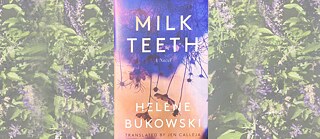October 2021
Helene Bukowski: Milk Teeth

If The End We Start From whetted your appetite for eco-fiction, we think you’ll love Helene Bukowski’s debut Milk Teeth.
It has been – there is no denying it – a somewhat apocalyptic year. Even leaving aside the daily figures of rising and falling Covid cases and all that they herald, waking up to the news this past summer has meant waking up to new tragedy. Wildfires in Siberia. Floods in Germany. Hurricanes across Central America. As we count down the days until COP26, the urgency of the demands which need to be met at the Climate Change Conference becomes ever more apparent. If 2020 felt like living through the early pages of Emily St John Mandel’s pandemic dystopia Station 11, 2021 has felt like the pre-curser to Megan Hunter’s poetic debut The End We Start From, an elegantly sparse novella which examines new motherhood against a backdrop of catastrophic flooding.
If The End We Start From whetted your appetite for eco-fiction, we think you’ll love Helene Bukowski’s debut Milk Teeth, which is just out in Jen Calleja’s atmospheric English translation. Milk Teeth is set several decades after climate catastrophe has led to social and political breakdown. Skalde lives with her mother Edith in “the territory”. Edith’s treatment of her daughter veers between remoteness and cruelty, and the pair are largely treated with suspicion by the other residents of the territory.
Resources are scarce and fiercely protected in this land where months of fog are followed by unending scorching heat, and so outsiders aren’t tolerated. The bridge connecting the territory to the mainland has been destroyed, and any outsider who makes it to the territory faces death. So when the adult Skalde comes across Meisis – a young girl whose red hair marks her as an outsider – and decides to look after her, tensions come to a head.
Like The End We Start From, Milk Teeth is a sparse but evocative book. Bukowski builds her world gradually, so that the reader, like Skalde as she grows up, only slowly comes to understand the landscape and the rules of the world she lives in. The result is an intentional disorientation, with the reader drawn into the claustrophobia of the territory.
Yet despite the claustrophobia – despite the harshness of the climate and the cruelty of the people – this is a surprisingly sensual book. Skalde vividly describes not just the landscape she loves (“I especially liked GOLDENROD. They had bright yellow blossoms and grew so high that they towered over me.”), but also her mother’s incongruous glamour – her make-up and impractical clothes. She tries to make sense of the world by writing it down: “I SAW THE BLUE OF THE SKY, IT LOOKED AS IF IT HAD BEEN HOLLOWED OUT, AND I THINK THAT EVENTUALLY THE HOUSES WILL ALSO STAND LIKE SKELETONS.” (Skalde’s surreal images are wonderfully rendered in Calleja’s taut prose.) There is beauty to be found in the worst of times, Bukowski reminds us – and even in the worst of times, as Skalde comes to realise, we always have a choice.
About the author
Annie Rutherford is an incorrigible bookworm and Jill of all (word-based) trades. She is the Assistant Festival Director at StAnza (Scotland’s international poetry festival), a German-English literary translator, and runs Lighthouse Bookshop’s Women in Translation book group, among other things. She has been known to read while cycling (she does not recommend it), and can spot a misplaced apostrophe at a distance of fifty yards.Borrow the original German title of the book from our Glasgow library shelf.
Reserve your digital German copy from the Onleihe.
Find out more about the blog.